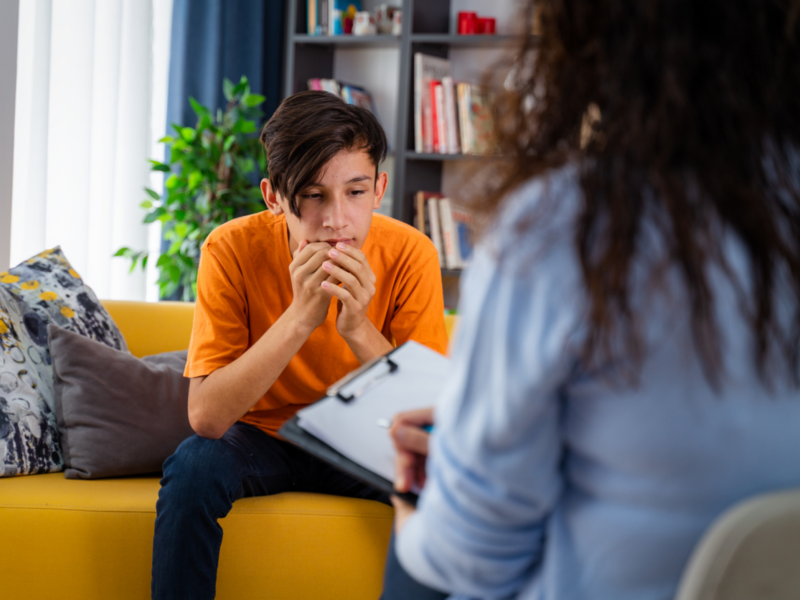
Table of Contents
How to Face Your Fear of Therapy
Written By: Charlie Health Editorial Team

Clinically Reviewed By: Dr. Don Gasparini
November 2, 2023
6 min.
Overcoming the fear of therapy might seem like a big challenge, but it's doable. Keep reading to learn some simple steps to get past those fears and make therapy a positive experience.
Learn more about our Clinical Review Process
Table of Contents
If you’re scared to go to therapy, you’re not alone. The fear of therapy, defined as being scared to talk with a mental health professional, is actually fairly common, especially when beginning therapy sessions, research shows. People may be scared to talk to a mental health professional for many reasons—including societal stigma and negative past experiences—but in reality, therapy is a private place where you can talk about your feelings and issues with someone who can help. Below, we unpack some common reasons people may have a fear of therapy and explain how to overcome these concerns.

Clinicians who will listen to your worries
Personalized care from the comfort of your home.
Why you might be scared of going to therapy
There are many societal and personal reasons why people may be scared of going to therapy. This fear can come from societal stigmas, like the belief that it’s not okay to ask for help or that talking with a therapist means you’re weak or crazy. These concerns are common but untrue—it’s akin to feeling embarrassed about going to a doctor when you have a broken arm; no one expects you to heal from physical injuries by yourself, and the same goes for your mental health.
Others may have personal concerns about going to therapy. For instance, if you believe that therapy is lying on a couch and sharing every little detail of your life and deepest, darkest secrets, it can sound scary. While it’s understandable to be worried and unsure of what to expect from therapy, the truth is that this commonly-portrayed version of therapy is not usually what it is like. In reality, therapy is a private place where you can talk about your feelings and issues with someone who can help.
Also, some people are concerned about what they’ll discover about themselves in therapy. It’s like opening a box of old memories and feelings you’ve kept closed for a long time. Facing those things can be frightening.
It’s important to remember that going to therapy is a brave step. It’s a journey to understand yourself better and find ways to feel happier and healthier. So, therapy can be a positive and helpful experience, even if it feels scary at first.
Mental health disorders tied to the fear of therapy
For some people, though, the fear of therapy may be connected to a mental health condition. For instance, social anxiety, specific phobias, and anxiety disorders can all be tied to and exacerbate the fear of therapy.
The fear of therapy itself isn’t considered a mental health disorder, but it can be a barrier to seeking needed mental health support. Overcoming the fear of therapy may be crucial in addressing these underlying mental health issues. Therapists are trained to work with people with various anxieties and phobias, including those related to therapy, and can provide support and guidance in managing these fears. Here’s more on mental health conditions that may be connected to the fear of therapy:
Social anxiety disorder
Specific phobias
Generalized anxiety disorder
Panic disorder
Avoidant personality disorder
Fear of judgment or criticism from therapist
Some people may develop a specific fear related to therapy
Heightened anxiety about the therapy process
Anxiety-induced panic attacks in anticipation of or during a therapy session
Fear of criticism or rejection from therapist
Social anxiety disorder
Social anxiety disorder is characterized by an intense fear of social situations and judgment from others. It can intersect with the fear of therapy because therapy sessions involve one-on-one interactions with a therapist. People with social anxiety may fear judgment or criticism from the therapist, leading them to avoid therapy even when needed.
Specific phobias
Specific phobias involve intense and irrational fears of specific objects or situations. While not everyone with a fear of therapy will have a specific phobia, some people may develop a specific fear related to therapy. This could include the fear of the therapy office, the therapist, or the therapy process. Such fears can act as barriers to seeking help.
Generalized anxiety disorder
Generalized anxiety disorder (GAD) often involves excessive worry and fear about various aspects of life. In the context of therapy, people with GAD might experience heightened anxiety about the therapy process, including concerns about what might be discussed or revealed during sessions.
Panic disorder
Panic disorder is characterized by recurrent panic attacks, which can be triggered by specific situations or events. The anticipation of a therapy session can be anxiety-inducing for people with panic disorder, as they might fear having a panic attack during the session or while discussing sensitive topics.
Avoidant personality disorder
People with avoidant personality disorder often fear rejection and criticism, making engaging in social interactions difficult. This fear can extend to therapy, where they may be afraid to open up to a therapist due to the potential for perceived rejection or judgment.
Overcoming the fear of therapy
Overcoming the fear of therapy might seem like a big challenge, but it’s doable. Many people are scared to start therapy at first, but with the right approach and patience, you can make therapy a positive and transformative experience. Here are some simple steps to help you get past those fears and make therapy a positive experience:
Educate yourself
Start by learning more about what therapy is all about. It’s not as mysterious as it may seem. You don’t have to spill every secret in your first session. Therapists are there to help and guide you at your own pace. Learning more about what therapy is like can make it less scary to reach out to a caring therapist who can support you on your journey to feeling better.

Find the right therapist
Look for a therapist you feel comfortable with. It’s a bit like finding a friend who gets you. Therapists come in all different styles, so take your time to find someone you connect with and who specializes in the kind of help you need. You can also consider starting with a consultation, which is a short call (that’s usually free), which gives you a chance to get to know the provider better and share what you’d like to work on with them.
Share your fears
Don’t be afraid to talk to your therapist about your fear of therapy. It’s okay to be anxious about therapy and sharing that can actually be a good starting point for your sessions. Your therapist will understand and help you cope with these feelings.
Remember, it’s confidential
Therapy is a confidential space. Your therapist won’t share your secrets with others (barring instances in which they are worried about your safety or the safety of someone else). Knowing this can help you feel more secure about opening up.
Set small goals
Don’t rush. Take therapy one step at a time. Realize that therapy is a gradual process, and you can set small goals. For instance, start by discussing less intense topics before delving into deeper issues.
Talk to others
Sometimes, hearing about other people’s positive experiences with therapy can ease your fears. Knowing that therapy has helped others can make it seem less intimidating.
Focus on the benefits
Think about the positive changes therapy can bring to your life. Better mental health, improved relationships, and a happier you can be the prize.

Be patient with yourself
Be kind to yourself. Don’t be too hard on yourself if it doesn’t feel perfect immediately. Therapy is a process, so it can take time to see progress. Remember that you’re brave for trying something new and scary.
How Charlie Health supports those with a fear of therapy
If you’re scared to begin therapy, Charlie Health is here to help.
Charlie Health’s virtual Intensive Outpatient Program (IOP) offers personalized mental health treatment for teens, young adults, and families who need more than once-weekly therapy, including those facing a fear of therapy and other specific phobias. Our sessions—including peer groups, individual counseling, and family therapy—are entirely virtual, which can create a more comfortable setting for those who are afraid of therapy. For instance, clients can bring a friend or family member to their first online session to provide support.
Remember, seeking therapy is a brave step towards better well-being, and your Charlie Health therapist is there to support you in your journey. Overcoming your fear can lead to personal growth and a better life.




